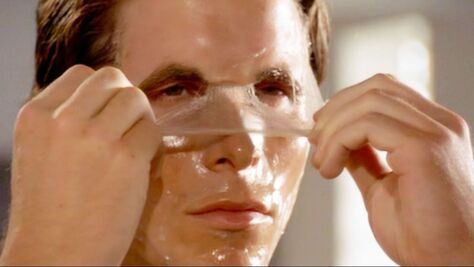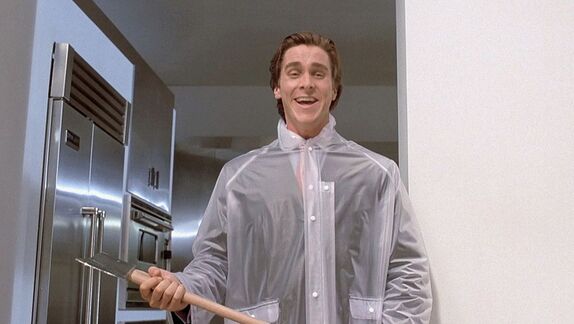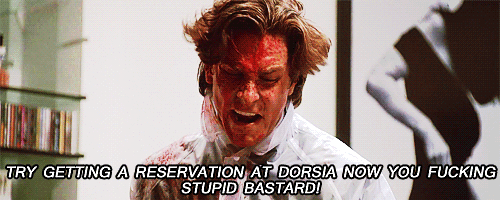 Social commentary has always been an inherent part of the horror genre, conveying real-world sentiment within the director’s fantasy. This makes specific issues and commentary more palatable for some viewers, and twenty years later, American Psycho remains a strong example of this... ...Originally released in 2000, director Mary Harron's adaptation of Bret Easton Ellis' novel highlights 80s yuppie culture in New York City. Focusing on Patrick Bateman, famously played by Christian Bale, a young wall street vice president who is quickly losing control over his violent urges. His obsession manifests in numerous acts of violence against men he feels intimidated by and women he views as inferior. Much like the novel, the film was considered polarizing due to its extreme violence and misogyny. While these are notable factors establishing Bateman character, they aren't solely responsible for American Psycho's continued prominence. As much discussion as the film generates about its titular character, in the end, the film isn't really about Patrick Bateman. Its purpose isn't to establish whether or not Bateman is a serial killer; rather, it's a damning indictment of yuppie culture. The film's commentary on the hedonism and narcissistic nature of this subcultures’ members is what makes American Psycho a meaningful distillation of the '80s culture. American Psycho succeeds as a biting satire because its premise is a somewhat ludicrous one. Yet, using this as the foundation of its commentary is genius. The audience quickly learns that all yuppies are a combination of narcissistic, inebriated, or misogynists, continually competing to outdo one another. From their business suits, haircuts, apartments, to their business cards, members of this culture thrive on emasculating their competition. This drive to outshine one another leads to the film's most comical recurring gag, yuppies being indistinguishable from one another. There are countless examples of yuppies, and Bateman himself, mistaking acquaintances for one another. The most memorable example being the finale when Bateman confesses his crimes to his lawyer, who not only disregards his confession but mistakes him for someone else entirely. This leads Bateman to realize that even he isn't sure who he has potentially killed. Further instances of reinforcing their inability to distinguish one another, is the iconic business card exchange scene. Bateman and his coworkers compare business cards as a form of a "measuring contest." Not only does Bateman lose this game, but the viewer learns that all of his coworkers are also the vice president of the company. This continued lack of distinguishing identity is ironically the very thing all yuppies actively strive to avoid, yet it is their defining trait. The concept of a distinct identity is why the satire of a wall street exec moonlighting as a serial killer works so well. The only way for Bateman to separate himself from the pack is to form this serial killer persona. Whether or not you believe that Bateman is carrying out these acts of violence, in the end, doesn't matter. Everything is explained away or overlooked by others due to his yuppie status and inherited resources that separate his class from ordinary folk. Given the despicable and denigrating nature of the film's characters, it isn't that far-fetched to assume they are capable of the actions with which they frequently speak of. While I believe that Bateman does have several instances of real-world violence, the idea that he can't keep his victim's names straight further shows just how comical his fantasy is. Bateman being the protagonist of his fantasy is another recurring theme of the film that highlights yuppies' narcissistic personalities. Bateman is always the voice of reason or the most knowledgeable person in any conversation. Bateman chastises Craig McDermott's (Josh Lucas) anti-Semitic rant during lunch. Bateman is the one to set the record straight on the current state of affairs during dinner. And Bateman is the one who informs Timothy Bryce (Justin Theroux) that you, in fact, cannot catch dyslexia or dementia from unprotected sex. While Bateman constantly flexes his "superiority," his fellow yuppies show their ignorance on just about every broached topic. Bateman is very much the hero of his own story, given how yuppies strive to be the alpha of every relationship. Even this notion of being an alpha that props up yuppies ego is a falsehood. Their communal lack of intelligence, despite all of them attending ivy league schools, implies that the only thing making them unique are their connections and family money. The myth that yuppies success is solely due to their hard work is quickly dispelled, as not a single yuppie is ever shown doing any actual work. Their days are spent indulging at lavish restaurants, sipping cocktails at social clubs, or doing copious amounts of recreational drugs at night clubs. Scenes occurring at Bateman's office show him inquiring about lunch or dinner plans, before kicking his feet up and watching The Price is Right. Not exactly burning the midnight oil. A lack of work ethic is further driven home when private detective Donald Kimball (William Dafoe) interviews Bateman about Paul Allen's disappearance. As Kimball walks in, Bateman pretends as if he's on an urgent call, giving lifestyle and fashion advice to an underling. When Kimball inquires whether or not it was an important call, Bateman lies and says they were mulling over business dealings. Maintaining a perceived perception of importance remains of the utmost concern to yuppies, despite being contrary to reality. In a rare moment, Bateman is made the butt of a joke, as Kimball coolly remarks, "I know how busy you guys can get," as Bateman clumsily clears his desk of swimsuit magazines and a cassette player. Harron intended to illustrate for the viewer that despite yuppies seeing themselves as industry leaders and social titans, they are inept in every facet of their lives. This lack of importance is frequently hammered home by Bateman's repeated "I have some videotapes to return," excuse to get out of situations. The fact that the vice president of a company can't come up with a more concrete excuse or an actual reason for being busy speaks to a lack of importance. Moments such as this are what stick with me all these years after American Psycho’s release. Mary Harron's unpacking of this vile and self-absorbed social class, within the confines of a horror film speaks to just how strong the film's message is. By presenting its complex and multi-layered commentary, within the familiar confines of a genre film, it makes the subject matter more palatable for viewers. While Bateman's perceived reality is up for debate, the genius of Harron's creative and nuanced exposure of parasitic subcultures is not. By Jay Krieger
0 Comments
Leave a Reply. |
Archives
March 2023
|


 RSS Feed
RSS Feed